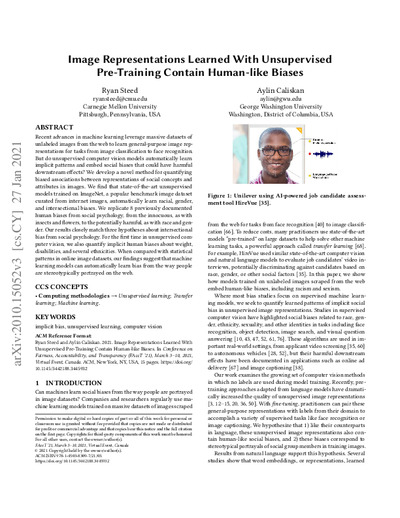Image Representations Learned With Unsupervised Pre-Training Contain Human-like BiasesRyan Steed, Aylin Caliskan
Publikationsdatum:
|
 |
 Diese Seite wurde seit mehr als 7 Monaten inhaltlich nicht mehr aktualisiert.
Unter Umständen ist sie nicht mehr aktuell.
Diese Seite wurde seit mehr als 7 Monaten inhaltlich nicht mehr aktualisiert.
Unter Umständen ist sie nicht mehr aktuell.
 Zusammenfassungen
Zusammenfassungen
Recent advances in machine learning leverage massive datasets of
unlabeled images from the web to learn general-purpose image representations for tasks from image classification to face recognition.
But do unsupervised computer vision models automatically learn
implicit patterns and embed social biases that could have harmful
downstream effects? We develop a novel method for quantifying
biased associations between representations of social concepts and
attributes in images. We find that state-of-the-art unsupervised
models trained on ImageNet, a popular benchmark image dataset
curated from internet images, automatically learn racial, gender,
and intersectional biases. We replicate 8 previously documented
human biases from social psychology, from the innocuous, as with
insects and flowers, to the potentially harmful, as with race and gender. Our results closely match three hypotheses about intersectional
bias from social psychology. For the first time in unsupervised computer vision, we also quantify implicit human biases about weight,
disabilities, and several ethnicities. When compared with statistical
patterns in online image datasets, our findings suggest that machine
learning models can automatically learn bias from the way people
are stereotypically portrayed on the web.
Von Ryan Steed, Aylin Caliskan im Text Image Representations Learned With Unsupervised Pre-Training Contain Human-like Biases (2021)  Dieses Konferenz-Paper erwähnt ...
Dieses Konferenz-Paper erwähnt ...
 Zitationsgraph (Beta-Test mit vis.js)
Zitationsgraph (Beta-Test mit vis.js)
 1 Erwähnungen
1 Erwähnungen 
- Fairness and Machine Learning - Limitations and Opportunities (Solon Barocas, Moritz Hardt, Arvind Narayanan) (2023)


 Volltext dieses Dokuments
Volltext dieses Dokuments
 |  Image Representations Learned With Unsupervised Pre-Training Contain Human-like Biases: Artikel als Volltext ( Image Representations Learned With Unsupervised Pre-Training Contain Human-like Biases: Artikel als Volltext ( : :  , 991 kByte; , 991 kByte;  : :  2021-03-21) 2021-03-21) |
 Anderswo suchen
Anderswo suchen 
 Beat und dieses Konferenz-Paper
Beat und dieses Konferenz-Paper
Beat hat Dieses Konferenz-Paper während seiner Zeit am Institut für Medien und Schule (IMS) ins Biblionetz aufgenommen. Beat besitzt kein physisches, aber ein digitales Exemplar. Eine digitale Version ist auf dem Internet verfügbar (s.o.). Es gibt bisher nur wenige Objekte im Biblionetz, die dieses Werk zitieren.










 Classification
Classification false positive rate
false positive rate Gesichtserkennung
Gesichtserkennung GPT-2
GPT-2 machine learning
machine learning Modelle
Modelle Psychologie
Psychologie Statistik
Statistik Biblionetz-History
Biblionetz-History